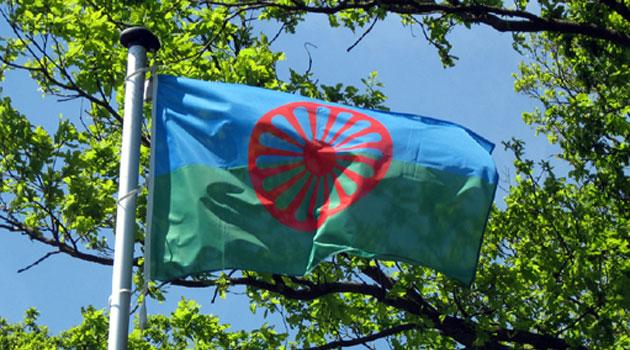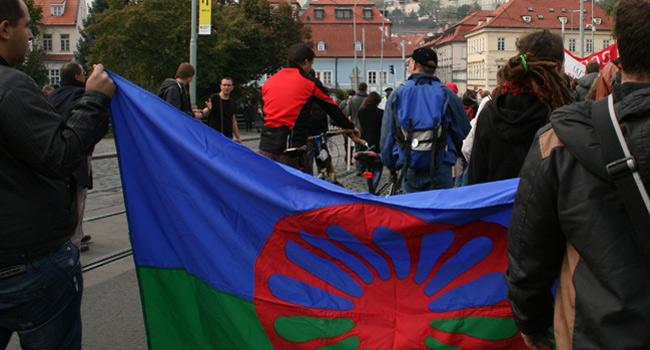Roma in Jihlava, Czech Republic prevented from renting space for International Romani Day, celebrations proceeding anyway

This year’s celebrations of International Romani Day (8 April) are taking place in Brno, Chomutov, České Budějovice, Jihlava, Nový Jičín, Ostrava, and Prague. The main theme of these celebrations is coexistence and collaboration between non-Roma and Roma. Various events – concerts, exhibitions, lectures and theater performances – have been underway in those Czech towns since the beginning of April.
In the town of Jihlava, organizers had to cope with discrimination when they attempted to rent a gathering place, but events are underway there despite the setback. Jihlava’s informally-organized collective of Roma called “Zor Jilestar” has been running its events since Wednesday, 5 April. The celebrations began with a community cleanup of the area around a children’s playground, followed by a wiener roast.
Yesterday Romani artist Luděk Farkaš held the vernissage of his exhibition there. His paintings will be on view at the Mikulka restaurant in Jihlava for roughly the next month.
The main part of the program is happening today, Friday, 7 April. At 11 AM in the Sokol Bedřichov sports hall a junior football tournament was scheduled to begin.
In addition to players from the FC ROMA team in Jihlava, five other predominantly Romani teams will compete. The aim of the tournament is for the various teams to cooperate and present their skills, as they have limited opportunities to ever meet on the same pitch, and the competition will be a shared experience for the players and their supporters alike.
Another attractive component of the Jihlava program is a panel discussion starting today at 14:00 in the Radniční restaurace about Romani partisan Josef Serinek, who fled the concentration camp at Lety by Písek during the Second World War and subsequently fought in the Vysočina area in connection with the local evangelical resistance. Last year a book by historian Jan Tesař entitled “Česká cikánská rapsodie” (“Bohemian Gypsy Rhapsody) was published about this figure showing that this history is significant for Jihlava and its environs.
The discussion will draw attention to the local aspect of the story. The panel will feature the historian Mgr. Pavel Baloun, the journalist Mgr. Markus Pape, and Romani activist Jozef Miker.
That debate will be moderated by Doc. PhDr. Michal Stehlík, Ph.D. The day will then culminate in a gala evening beginning at 20:00 in the Dělnický dům, comprised of several parts.
The first part will be dedicated to giving awards to leading Romani men and women in Jihlava, as well as to young talents who are awaiting their opportunity to make a contribution. A jury comprised of non-Romani and Romani members has been choosing whom to nominate in four categories.
Special prizes will also be given. The evening will feature performances by local dance groups (Šukar Čhaja, Karinka, Lole Čhama, Lucka and Nysha D), followed by the piece de resistance, a dance party with live music by the Martin Fečo and Petr Gujda band.
“International Romani Day is an important traditional holiday for us. For that reason, we are glad we can celebrate it in Jihlava this year in a way that has been designed by the Romani community themselves through activities Romani people have been contributing toward organizing from the very beginning. We thank the City of Jihlava, the Embassy of the USA in the Czech Republic, and the FABES, s.r.o. firm for supporting our efforts,” organizer David Drevňák said.
Eva Nováková added: “Our aim was originally a different one. We wanted to take advantage of the fact that 8 April this year falls on a Saturday and hold all of the events on the same day. Nevertheless, we encountered discrimination on the part of the owners of the social hall, who refused to rent their spaces to Romani people. That illegal behavior, which is today still common, reminds us that International Romani Day is not just a celebration, but, like International Women’s Day, is also a symbol of the continuing fight for the elimination of all forms of discrimination, the fight for equality.”
In the year 1990, 8 April was declared International Romani Day to commemorate the historically first-ever World Romani Congress held on that day in 1971 in Orpington in Great Britain. That gathering established the basis for today’s international Romani movement, including the international Romani anthem and the international Romani flag.
Delegates to the gathering agreed to use the term “Roma” as their official designation. The dozens of participants from various countries included representatives from what was then Czechoslovakia, such as the physician and subsequent president of the International Romani Union, MUDr. Ján Cibuľa, and the first Romani college graduate and lawyer from the Czech Republic, JUDr. Tomáš Holomek.
The Facebook “event” for the Jihlava program is here. More information about the nationwide initiative to commemorate International Romani Day is here.
